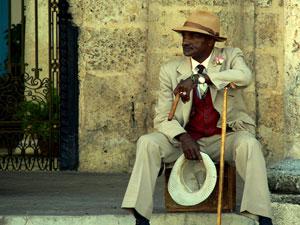Preparing Cuba for the free market from the US
(Image by Les Haines (cc:by))
This story was originally covered by PRI’s The World. For more, listen to the audio above.
The Castro regime recently announced it was laying off half a million workers from the government’s payroll. Then it followed up by announcing that, starting this month, Cubans will have more freedom when it comes to starting small private businesses, within limits, of course.
Some doubt whether or not these reforms will work. Antonio Jorge, who left Cuba in 1962 and is now a senior fellow at the Institute of Cuban Studies at the University of Miami, told PRI’s The World, “You cannot create a market economy simply by issuing a decree.”
The recent moves remind Jorge of the so-called “periodo especial” or special period, after the Soviets ended subsidies in the early ’90s. Jorge told The World, “the Cuban government at that time allowed for the licensing of about 200,000 people to provide private services.” The economy still languished and famines broke out across the country.
Jorge says the Cuban government needs to lay the foundation of a free market. And some nonprofits in the United States are trying to help, by preparing Cubans for life in a more capitalist society.
“We help the small business sector in Cuba by providing what we call a business in a box,” Teo Babun, a nonprofit consultant who’s been working to build small businesses in Cuba for more than ten years. He helps Cuban entrepreneurs by sending them a box with everything they need to get started. A kit for a graphic designer, for example, includes tools for cutting and pasting graphics. A newly minted graphic designer in Cuba would also get lessons on basic free market principles: How to price your services, how to market your business, what to do with revenue.
There is plenty of cash floating around the island with which to start businesses. The Cuban American community sends millions of dollars each year back to their families in Cuba. Babun estimates that “it could be from 800 million to a billion dollars a year of assistance that is provided by the Cuban American community to the Cubans.”
That money could be put to good use through free-market efforts like Babun’s. Speaking about a recipient of one of his kits, he told The World, “when you consider that you earn an average of $20 a month in Cuba, this person is a middle class person in two weeks. God bless them and now we have one more independent, self-employed person in Cuba.”
PRI’s “The World” is a one-hour, weekday radio news magazine offering a mix of news, features, interviews, and music from around the globe. “The World” is a co-production of the BBC World Service, PRI and WGBH Boston. More “The World.”
Our coverage reaches millions each week, but only a small fraction of listeners contribute to sustain our program. We still need 224 more people to donate $100 or $10/monthly to unlock our $67,000 match. Will you help us get there today?
